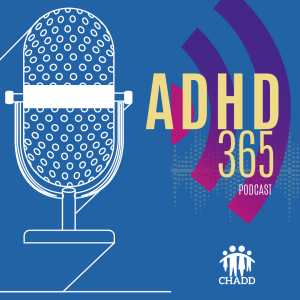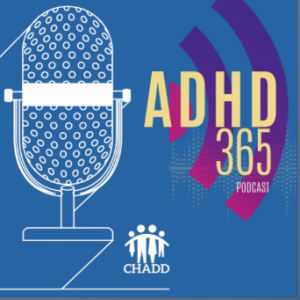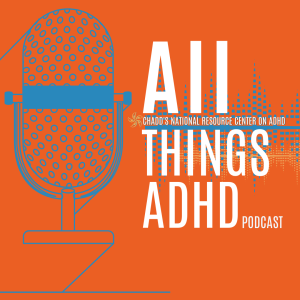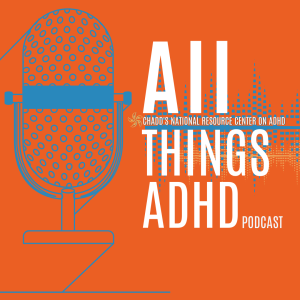Episodes

Tuesday Jun 09, 2020
Health Disparities: Barriers to ADHD Diagnosis and Treatment
Tuesday Jun 09, 2020
Tuesday Jun 09, 2020
Podcast Transcript: https://chadd.org/podcasts/health-disparities-barriers-to-adhd-diagnosis-and-treatment/
Summary: What are the consequences of late diagnosis and treatment for ADHD in underserved and disenfranchised communities? Brandi Walker, PhD, shares her insights into what healthcare providers, parents, and educators can do to decrease health disparities in the United States.
Brandi Walker, PhD: Major Brandi Walker is an active-duty officer in the Army’s Medical Services Corps, serving as a clinical psychologist at Fort Bragg, North Carolina. She is a recent graduate of Howard University's clinical psychology program, where she specialized in children, adolescents, and families. She obtained a master’s in rehabilitative counseling from the University of Maryland, College Park, and has held licensure as a graduate-level, licensed alcohol and drug counselor, and certified rehabilitation counselor. An advocate for research, Walker currently leads a nationwide community health study on ADHD and sleep in the pediatric population.
Learning Objectives: 1. Learn potential diagnosis and treatment barriers for different communities 2. Learn how barriers affect African-American, Latino-American, and immigrant communities 3. Understand how access to care impacts academic achievement, relationships, and quality of life 4. Learn common gaps for school-aged children with ADHD and how it follows into adulthood 5. Understand how parents, teachers, and medical personnel can collaborate

Thursday May 28, 2020
Parenting a Child with ADHD and Dyslexia
Thursday May 28, 2020
Thursday May 28, 2020
Dr. Roberto Olivardia shares his experience growing up with ADHD and being a parent of a child with ADHD and dyslexia. This episode, Parenting a Child with ADHD and Dyslexia, is an up-close and personal journey of a parent balancing his own difficulties with ADHD while equipping his child, who has a severe form of dyslexia, with education, learning tools, and self-assurance to help him succeed in life.
Roberto Olivardia, PhD
Roberto Olivardia, PhD, is a clinical psychologist and lecturer in the department of psychiatry at Harvard Medical School. He specializes in the treatment of ADHD, eating disorders, obsessive-compulsive disorder, and body dysmorphic disorder. He serves on the professional advisory boards for CHADD, ADDA, and the National Association for Males with Eating Disorders.

Wednesday May 20, 2020
Guidance for Uncertain Times: Alone Together-Putting an End to Family Chaos
Wednesday May 20, 2020
Wednesday May 20, 2020
Podcast Transcript: https://chadd.org/podcasts/guidance-for-uncertain-times-alone-together-putting-an-end-to-family-chaos/
Summary: Millions of families across the world are faced with new and unexpected disruptions to their lives. The lengthy stay-at-home restrictions and days without structure could lead to stress and anxiety, which can be a recipe for chaos for parents and children affected by ADHD.
Christine Kotik, PCC, gives advice to help parents and children learn how to coexist "alone together" by creating expectations, using the ladder technique to gauge anger, learning effective communication strategies, and more.
Christine Kotik, PCC: Christine Kotik is the coordinator of the Columbus, Ohio Chapter of CHADD and a facilitator of CHADD's Parent to Parent program. She is also a member of the ADHD Coaches Organization, where she serves on the board of directors as treasurer. Her training includes certification through the Coach Training Alliance, JST Coaching & Training, and Coach Approach for Organizers.
Learning Objectives: 1. How to avoid conflicts during the quarantine 2. How can parents who are working, teaching, and taking care of the home get their children to contribute to effort 3. How to reduce feelings of being overwhelmed 4. Ways to reduce tension in the household

Tuesday May 12, 2020
Guidance for Uncertain Times: Mothers and ADHD—Permit Yourself to Breathe
Tuesday May 12, 2020
Tuesday May 12, 2020
Podcast Transcript: https://chadd.org/podcasts/guidance-for-uncertain-times-mothers-and-adhd-permit-yourself-to-breathe/
Summary: Women with ADHD who are mothers often have several challenges they face in their everyday life. With the current pandemic, daily life can become even more difficult with ADHD symptoms. There are difficulties of procrastination, feeling overwhelmed, being disorganized, as well as being distracted. At times, it can be difficult to even get through the day, especially when working from home. Providing care for kids with or without ADHD brings on additional challenges for mothers with ADHD.
What are some strategies to cope with symptoms and challenges as a woman and a mother with ADHD? Terry Matlen discusses coping strategies during uncertain times and how to support children’s schooling while working from home.
Terry Matlen, ACSW: Terry Matlen is a therapist, consultant, writer, speaker, and ADHD coach. She is the author of The Queen of Distraction: How Women with ADHD Can Conquer Chaos, Find Focus, and Get More Done, and Survival Tips for Women with ADHD. She is the director for two websites, ADDconsults.com and queensofdistraction.com. Terry served as the vice president of Attention Deficit Disorder Association and as the CHADD coordinator in Minnesota.
Learning Objectives: 1. Gain an understanding of the challenges faced by women with ADHD who are mothers 2. Learn coping strategies for daily ADHD challenges and the challenges added by uncertain times 3. Understand how to support children in school while working from home 4. Discover how to cope when both mom and children have ADHD 5. Learn the importance of reaching out when help is needed

Tuesday May 05, 2020
Guidance for Uncertain Times: Navigating Teens at Home During COVID-19
Tuesday May 05, 2020
Tuesday May 05, 2020
Podcast Text Transcript
Parenting a teenager with ADHD who's confined at home during COVID-19 may present some challenges. How can parents and teens adjust to these circumstances? Some teens with ADHD find the restrictions suffocating and don’t want to adhere to safety protocols. The disruption to their lives may worsen or cause anger and behavior issues. Should parents be more forgiving of bad conduct or attitudes because of the pandemic?
What does Allison Dankner, family behaviorist and learning specialist, have to say about navigating life with teens during this crisis? In the latest ADHD 365 podcast, she gives guidance to parents and teens on ways to communicate and coexist under one roof during COVID-19.
Allison C. Dankner, MS Ed, PSY BS. Family Behaviorist and Learning Specialist
Learning Objectives:
Learn how parents can support their teens during this crisis.
Get suggestions for conversing with frustrated teens.
Find out how to help teens create new habits with schoolwork and social life.
Get suggestions for creating a new schedule.
Find out how to give teens autonomy and collaborate with them.
To learn more about Allison Dankner, visit ALLISONCD.com

Monday May 04, 2020
Monday May 04, 2020
Podcast Transcript: https://chadd.org/podcasts/guidance-for-uncertain-times-when-kids-attend-school-from-home-tips-for-parents/
Summary: Are you a parent now faced with supervising while your child with ADHD attends schooling from home? We know that COVID-19 has caused households to reprioritize family life. It’s no longer business as usual. You, like many other parents, are balancing work, home, and your child’s remote learning. This “new normal” comes with numerous challenges and requires patience, preparation, and structure. You need strategies that will make managing your child’s learning at home less stressful and overwhelming. In the latest ADHD 365 podcast, Ann Dolin, MEd offers expert advice on creating a framework for an ADHD-friendly learning environment. She provides tools that increase your child’s self-sufficiency and suggests communication techniques for discussing concerns about schoolwork.
Ann Dolin, MEd: Ann Dolin, MEd is the President and Director of Educational Connections. She holds a BA in Child Psychology/Elementary Education and a master’s degree in Special Education, with a concentration in Learning Disabilities, from Boston College.
Learning Objectives: 1. Learn strategies parents can use to help their kids with schooling at home. 2. Learn how to collaborate and talk with children about their schoolwork. 3. Learn how to implement accommodations if the child has a 504 or IEP plan. 4. Get suggestions for taking breaks, handling distractions, and maintaining motivation. 5. Learn strategies for parents who work at home while their children attend school from home.

Tuesday Apr 21, 2020
Guidance for Uncertain Times: Mindful Parenting
Tuesday Apr 21, 2020
Tuesday Apr 21, 2020
Podcast Text Transcript
ADHD often disrupts family life. Compound those disruptive patterns with the pressures of COVID-19, and you may find parenting wildly stressful and overwhelming, which in turn affects your child's behavior. None of us are at our best when we’re tapped out. Your parenting approach could make all the difference in the world during a tense situation. Is mindful parenting the right approach for your family’s needs? Could it improve your parenting skills?
Board-certified ADHD and executive function coach Pat Hudak is the president-elect of CHADD’s board of directors. She gives us insight into the power of mindful parenting and shares useful techniques that families can incorporate in daily life to achieve positive outcomes.
Patricia M. Hudak, PCC, BCC
Learning Objectives:
Gain an understanding of the components of mindful parenting.
Learn strategies for improving mindful communication and listening skills.
Understand how co-occurring conditions may affect teenagers.
Get suggestions parents can use while sheltering at home with children.
Learn how to have mindful and meaningful conversations with children and teens.

Friday Apr 17, 2020
Friday Apr 17, 2020
Podcast Transcript: https://chadd.org/podcasts/guidance-for-uncertain-times-tips-to-help-you-manage-and-avoid-family-conflicts/
Summary: Families coping with ADHD may experience conflicts due to the impact of the COVID-19 crisis. Parents need to manage their own stress levels to avoid or decrease the conflicts among their children, especially if there are teens at home. Dr. Margaret Sibley, PhD, offers strategies and tips for parents to help manage and avoid potential conflicts.
Margaret H. Sibley, PhD: Dr. Margaret Sibley is an Associate Professor of Psychiatry & Behavioral Sciences at the University of Washington School of Medicine and Seattle Children's Research Institute. Dr. Sibley’s work focuses on the diagnosis and treatment of ADHD in adolescents and young adults. She has authored or co-authored over 80 scientific papers on ADHD and published a book with Guilford Press on treating executive functioning and motivation deficits in teens. She is a member of the CHADD professional advisory board.
Learning Objectives: 1. How ADHD impacts conflict at home during COVID-19 2. Strategies for families to decrease conflict 3. How to manage stress as a parent 4. Strategies for managing sibling conflict 5. How to handle teenagers during COVID-19

Friday Apr 17, 2020
Guidance for Uncertain Times: Parenting Children With ADHD During a Crisis
Friday Apr 17, 2020
Friday Apr 17, 2020
Podcast Transcript: https://chadd.org/podcasts/guidance-for-uncertain-times-parenting-children-with-adhd-during-a-crisis/
Summary: Are you having a hard time with your children during the current pandemic? We know that COVID-19 has caused anxiety and worry in many homes. People are facing changes in their lives every day, practicing social distancing, working from home, and children being schooled at home. These changes can make it a challenge to manage ADHD symptoms and create a calm home. You can learn the strategies that will help you create calm during a pandemic, especially with ADHD symptoms and emotions.
Andrea Chronis-Tuscado, PhD: Dr. Andrea Chronis-Tuscano is the president of the International Society for Research in Child and Adolescent Psychopathology, an associate editor of the Journal of Consulting & Clinical Psychology, and a member of the CHADD Professional Advisory Board. Dr. Chronis-Tuscano currently serves as ADVANCE Professor for the College of Behavioral & Social Sciences (BSOS) at UMD.
Learning Objectives: 1. Learn strategies for keeping calm at home during times of crisis 2. Learn strategies for increasing positive emotions with parents and children 3. Identify ADHD symptoms that can make it more challenging and strategies to cope with them 4. Learn strategies for parents to help their children with ADHD 5. Learn strategies for parents managing their own ADHD

Friday Apr 17, 2020
Friday Apr 17, 2020
Podcast Transcript: https://chadd.org/podcasts/guidance-for-uncertain-times-ways-to-stay-healthy-during-the-coronavirus-pandemic/
Summary: Are you among the nearly 90 percent of Americans living under stay at home orders? It can be difficult to maintain healthy eating and sleeping routines when you’re not able to leave home or when daily life is stressful because of the complete change in daily routine. Dr. Roberto Olivardia provides information on designing a healthy routine, planning simple and nutritious meals, and getting enough exercise when your opportunities for movement are limited. Supporting your good health now is critical for lowering feelings of stress and maintaining a good sense of well-being.
Roberto Olivardia, PhD: Dr. Roberto Olivardia, is a clinical psychologist and lecturer in the Department of Psychiatry at Harvard Medical School. He maintains a private psychotherapy practice in Lexington, Massachusetts, where he specializes in the treatment of ADHD, executive functioning issues, and issues that face students with learning differences. He also specializes in th e treatment of body dysmorphic disorder, obsessive-compulsive disorder, and in the treatment of eating disorders in boys and men.
He currently serves on the professional advisory boards for CHADD, ADDA, and the National Association for Males with Eating Disorders. He is a member of the International OCD Foundation, International Dyslexia Association, Multi-Service Eating Disorders Association, and the American Association of Suicidology.
Learning Objectives: 1. Eating, sleeping and other health challenges faced during the pandemic 2. Tips and strategies for healthy eating 3. Exercises to do in and around the house 4. ADHD and sleep challenges 5. Strategies for proper sleep hygiene



